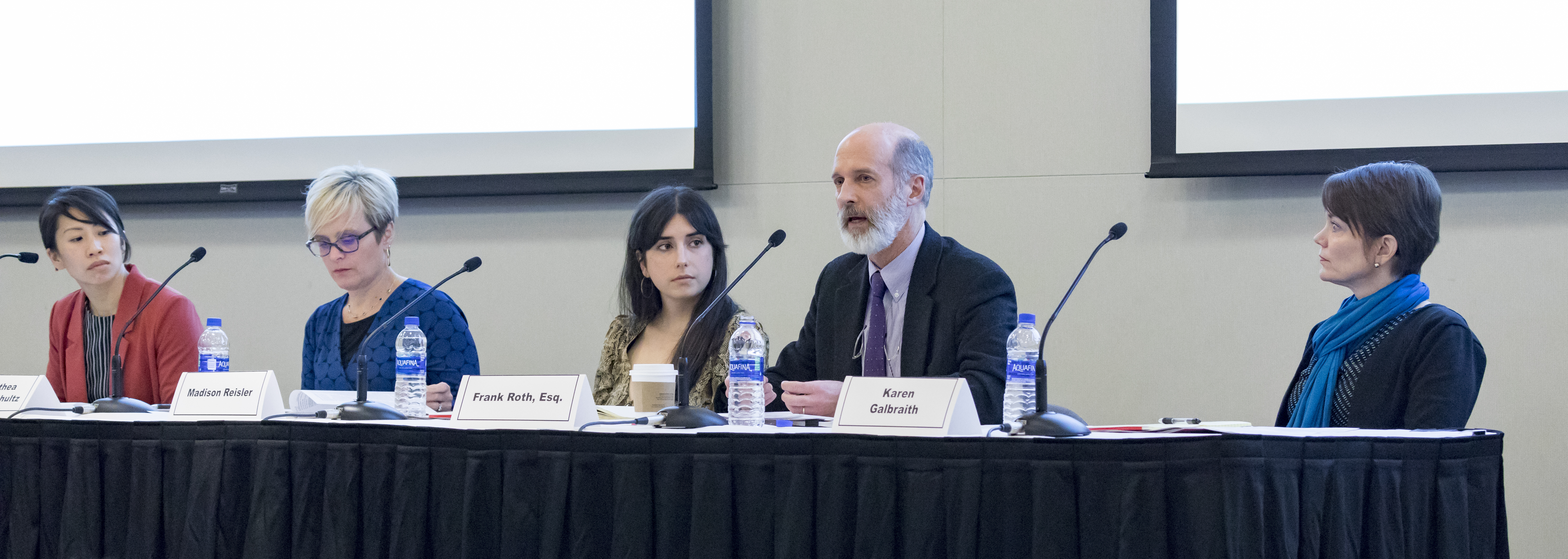Muhlenberg’s Title IX coordinator Lin-Chi Wang looked at the audience and said with a shy smile, “This is my first time moderating. I did some research online, so if this crashes and burns, blame the Internet!” She wanted to set the tone for the topic for discussion among Muhlenberg students, faculty and a panel of experts: proposed changes by the Department of Education for Title IX. “My sense,” Wang said, “is that it will be a positive, robust and dynamic discussion.”
Held on Jan. 24, the panel’s purpose was to familiarize students with a few of the proposed changes and tell them how they can submit feedback to the Department of Education, but the deadline for comments has passed.
Title IX is a federal law dating back to 1972, and its original purpose was to address sex discrimination in collegiate sports. It has since spread to cover discrimination on the basis of race and ethnicity, disability and sexual identity, and as panelist Karen Galbraith ’95 pointed out, stretches to primary and secondary schools. Every institution that receives federal funding—public or private—must adhere to these new guidelines if passed.
One of the most controversial new guidelines will require all colleges to use “due process” to discipline people accused of discrimination under Title IX. As part of its current process, Muhlenberg already has a comprehensive judicial process complete with a panel of students and faculty, which the Dean of Students Office oversees.
“The College already employs due process protections in our current process. What is different with the proposed regulations is that it will require a ‘live hearing’ and states that the College ‘must’ allow for ‘cross-examination’ and it ‘must’ be conducted by the party’s advisor. This is a very specific proposed mandate that was not previously part of the Dept of Education guidance,” said Wang in an e-mail.
The Judicial Panel asks the respondent and witnesses questions, and the respondent has the option to cross-examine witnesses. In Muhlenberg’s system, lawyers are not permitted to participate in hearings, and the complainant does not have to attend. This adviser can be a faculty member provided by the school, like they are at Muhlenberg, but could also be a lawyer. Alternatively, at any time prior to a determination of responsibility, the educational institution can facilitate an informal resolution process, such as mediation. This also is an option within Muhlenberg’s judicial process if both the respondent and complainant agree to it.
“Muhlenberg’s student conduct process as it pertains to sexual misconduct, intimate partner violence, and stalking does not have a live hearing any longer in the formal resolution process,” said Wang. “There is a thorough investigation conducted in which the parties are permitted to ask questions of each other and witness through the investigation.”
“When I hear the term due process, I immediately think of the constitutional definition,” said panelist Frank Roth, legal counsel at Lehigh University. The Fifth and Fourteenth Amendments provide equal protection to all citizens and mandate that the government cannot interfere. “We are not a court system. We are an educational institution that will adopt procedures,” added Roth.
Due process, Roth said, was not the right way to tackle Title IX violations, especially in private institutions. The new regulations will require schools to spend more resources on that when they could allocate them to something more needed. The possibility for lawyers to be “advisers” is also an issue for complainants and respondents who cannot afford a lawyer.

Title IX Director Lin-Chi Wang speaks at the “Know Your Rights” panel on Jan. 24. Photo Courtesy of Muhlenberg College Public Relations
The panelists took issue with the idea that for the complainant, the options are to either settle for a mediation or get cross examined. Karen Galbraith ’95, who works for the Pennsylvania Coalition Against Rape, noted “being cross-examined is hugely revictimizing and traumatic for everybody involved in that process.” She also expressed concern about the guidelines for protection of survivors, which state that protections cannot put “undue burden” on either the respondent or complainant. For example, a no-contact order is mutual; if a respondent sees the complainant in the dining hall, they must leave, and vice versa.
Madison Reisler ’19, a member of peer education group Voices of Strength, provided further insight from a student’s perspective. She was hopeful that counselors could attend hearings as the survivor’s adviser, or as emotional support if they cannot advocate. Further, she noted that many survivors want the name of perpetrators of harassment or assault to be public knowledge but policy does not allow it. At many schools, the students do it themselves. It becomes a safety issue for victims because people will not be aware of perpetrators. The proposed guidelines offer so much protection for complainants that respondents may feel less safe. The best thing to do, she said, is to ask survivors what their ideal outcome is.
Wang described Title IX as “a daily balancing act. Every interaction, communication, and consideration is a balancing act in how do we support people on campus who are experiencing something and how do we also uphold a fair and reliable and equitable process simultaneously? Is that possible in the situation? It’s always a case-by-case analysis.”
Attendee Chloe Gravereaux ’19 was thankful that panelists acknowledged Title IX’s “role is to make sure the college is doing the most they possibly can,” and reiterated the importance of students’ awareness of their rights and resources on campus.
Emily Segan ’19, when asked after the discussion about her concerns for Muhlenberg under the new guidelines, replied: “That it will become an even more rape-friendly campus.”
Reisler later suggested schools adopt a zero tolerance policy to “ensure people know this isn’t permissible. The school needs to stand by that gender inequality is behind these injustices. If the campus takes it seriously, the culture will follow.”
A previous version of this article stated that sexual misconduct cases require a live hearing. Associate Dean of Students & Director of Equity and Title IX Lin-Chi Wang has stated this is incorrect. This article has been updated to reflect this.























It is telling that all the comments from participants presume that the complainant is telling the truth. They also presume that all Title IX issues involve rape. This only underscores the need for stronger procedural protections for the accused. The current procedures are heavily biased against the accused. If college administrators decide to conduct investigations, they should not use the excuse of limited resources to take shortcuts. We should not accept a society where anyone can make an accusation and ruin a person’s life. Someday that person could be you or a loved one.